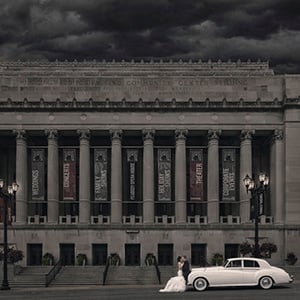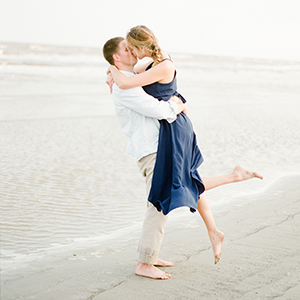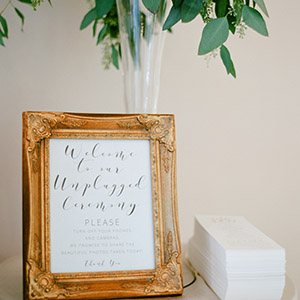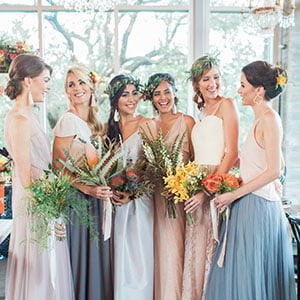8 Wedding Etiquette Questions Answered
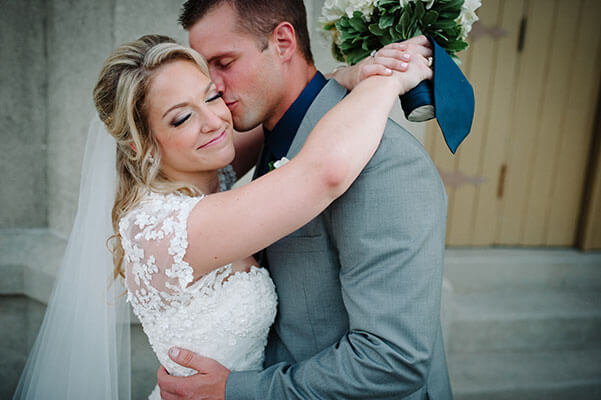
Photo: Adam Nyholt
Q: We’ve been to a number of weddings where it seemed like the couple was more interested in themselves than in their guests. How can we avoid that with our wedding?
A: The most memorable weddings are those where the wedded couple are gracious hosts, paying as much attention to the comfort of their guests as to the aesthetics of the event. Walk through the venue(s), consider the wedding day itself and anticipate the needs of your guests. Help them come prepared by including pertinent information on an invitation enclosure. For example, you can write, “Both the ceremony and reception will take place in the garden. You might wish to bring sunglasses, sunscreen, and a wrap in case it gets a bit chilly after the sun goes down.”
It is especially important to anticipate the needs of older guests and others with special needs. You might arrange for reserved parking spaces at the ceremony and reception sites, and make those guests who might need them aware in advance. Have a few tables and chairs at the cocktail hour for those who cannot stand around for an hour. Place “Reserved” signs on the tables and tell those guests in advance. You might also have someone in place to direct older guests, and guests with special needs, to the reserved tables. All too often reserved parking spaces and tables go unused because everyone modestly assumes they were reserved for someone else.
A graceful touch at a warm-weather ceremony is a refreshment station where guests can help themselves to water or another non-alcoholic cool beverage. Always be sure ushers are in place to direct guests to their seats and assist when needed. Ushers should also be able to tell guests where the restrooms are.
Q: From ceremony start to last dance, we have only about five hours with our guests. Make that four, if we skip out on the cocktail hour. How can we avoid being away from them for photography?
A: The cocktail hour has, in recent years, turned into a way to amuse guests while the couple (and sometimes their family and bridal party) is off being photographed. But couples who are photographed together before the ceremony are free to enjoy that time with their guests.
There is a much better way to get that first-look photo than avoiding each other before the ceremony. Your wedding consultant and photographer can work together to stage it. An hour and a half prior to ceremony time, with the photographer in place at a discreet distance, you can meet up in a quiet, photogenic spot. The moment will have a much greater impact than when the ceremony is underway and nerves are at fever pitch. You can enjoy a quiet, calming moment together. The photographer can start the pre-ceremony shoot with just the two of you, and then bring in the bridal party and family. If the shoot ends a half hour before ceremony time, everyone will have time to refresh themselves and relax a bit.
Q: I’ve always heard that a couple should tell their parents about the engagement first, but my fiancé wants to tell his daughter and even his ex-wife first. I think my parents should come before either of these.
A: Even if a child were not involved, it is courteous to inform a former spouse of one’s engagement at some point before she is likely to hear it from another source. When there is a child, the child must be the very first person told. For the child’s sake, the other parent needs to be the second. Then you may share the news with the parents of the bride and groom.
Q: We want to do a wedding website, but my parents are concerned about “TMI.” And my mom thinks putting links to our registries would be tacky.
A: I understand their concerns. Some couples are rather careless with their personal information on the Web, but you can do a wedding website without “letting it all hang out.” Think of the person you’d least like to know all about you. Then with every story or piece of information you think of adding, ask yourself how you’d feel about that person reading it.
While it has become quite common to put registry information on wedding websites, making that information the focus of the website would indeed be tacky. Rather than putting actual links, you might simply list the name of the companies (not more than three). Adding extra information stretches the bounds of good taste. And to even suggest a custom registry page complete with PayPal links would, I am sure, have your dear mother reaching for the smelling salts!
And remember, while it is perfectly proper to include it on a save-the-date or on the response card or other invitation enclosure, the website URL should not be on the actual invitation.
Q: We plan to handle RSVPs through our wedding website. Will we still need to order response cards?
A: Some people on your invitation list may prefer to RSVP electronically, but the unwired will find a response card more convenient. At the bottom of the traditional response card, add the line: “You may also RSVP at our wedding website, [URL].”
Q: We don’t drink (or have alcohol in our home), but some of our guests drink. We really don’t want alcohol at our wedding, but we don’t want to be rude. Do we need to tell people in advance that we’re not serving alcohol?
A: There is no “rule” that says alcohol must be served at a wedding. If you would not serve guests alcohol in your home, you need not feel obligated to do so at your wedding. There are many reasons couples choose to have a “dry” wedding, including religious reasons, the cost does not fit into their budget, or concerns about liability issues.
If you decide not to serve alcohol, there is no need for explanations and no need to tell people in advance. That said, guests are less likely to “expect” alcohol at a brunch, lunch or afternoon tea reception than they are at an evening reception.
Offer an array of beverages, ranging from sparkling water to a signature “mocktail.” Attractive glass dispensers of iced tea and lemonade, along with a gourmet coffee bar, add a festive touch.
Q: I’ve always wanted an elegant evening wedding, but our church has only three time slots for ceremonies: 10 a.m., noon and 2 p.m. What can we do with our guests for the three hours until the reception starts?
A: Synchronizing the ceremony and reception times is a common challenge for brides. Often, reception venues offer two time slots, generally 11 a.m. to 4 p.m. and 6 p.m. to midnight, which don’t mesh with the schedules of many ceremony locations. It is time to weigh your priorities. You can either forgo your dream of an evening wedding, or choose a different ceremony site. A three-hour gap between the ceremony and reception poses a number of problems. Yes, there are things your guests could do for those three hours—see a movie, go shopping, take a nap, mow the lawn—but will it be fun for them or make for a good party?
The idea of a “hospitality suite” at a hotel, perhaps the one where your reception is taking place or one where many of your guests are staying, will probably be suggested to you. Not a good idea. Do you want the added expense of an elegant pre-reception, or would you prefer to destroy the elegance you’re aiming for by interjecting an unpolished little party that’s out of character with the rest of the event? Either way, by the time the “real” reception starts, many guests will be partied out. Some will even drop out, increasing the number of no-shows at the reception.
Whatever there is for guests to do during a long gap in a wedding, they usually go home or to their hotel to slip into something more comfortable. Sadly, many don’t bother to change back into their wedding finery for the delayed reception, which certainly detracts from the elegance the bride had envisioned. There is no satisfactory solution to the gap problem. Pacing makes a party, and a gap simply destroys the flow of the event.
Q: We are both vegetarians and plan to have only vegetarian food at our reception, but my father (not a vegetarian) says we can’t “force our views on our guests.”
A: While those who are vegetarian for health reasons might be more flexible about what they serve guests, those who are vegetarian for deeply held personal or religious beliefs need not feel they must include meat on the menu. Modern caterers are well-versed in vegetarian cuisine and have many delectable meat-free options. After you and your caterer have narrowed down the possibilities, take your father along for the tasting. He likely will be surprised at how satisfying a vegetarian meal can be, even to a die-hard carnivore.

